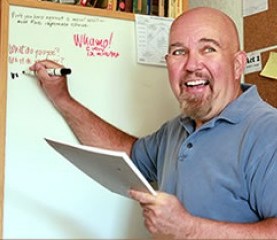(Originally published on Blogcritics.org)
At the National Association of Broadcasters (NAB) Show 2015, in the Las Vegas Convention Center, surrounded by every video camera made, virtual sets, lighting equipment, online streaming hardware and software platforms, they didn’t forget that it all begins with writing.
In “Self-Editing Basics: The Tools You Need to Improve Your Writing,” part of the Blogging Basics 101 series, author/editor Melanie Nelson put it this way: “A good editor will try to help you keep your voice. A really good editor wants to make you look awesome. But the best editor of your own work is usually you.”
Nelson said that maybe 50 percent of the stories she receives have the word “draft” in their title. “Why let someone else have control over your work?” she asked. “Learn to edit yourself.”
She suggested that people need a break before editing. “Most people don’t take a break. Twenty minutes, 30 minutes that’s fine,” she said. “The next day is better. When you come back you have a different perspective.”
Nelson provided 10 rules for self-editing:
- Manage the Thread. Look at your thread. Read every single word and make sure every single thing fulfills your promise in the title. Instead of trying to make an article all-encompassing, reference and link out. The way you find your thread is to ask yourself, “What is this article really about?”
- Use Headers. When readers can see your title and your headers, they know what they are going to get and will read the entire article. Give your headers parallel construction.
Not “Dog,” “Going to the Vet,” and “What Does That Tail Mean?”
but “Adopting a Dog,” “Going to the Vet”, and “Learning the Signs.”
- Condense Wordy Passages. Online, long paragraphs are intimidating and no one wants to read them. When you edit, look for long paragraphs and break them up. Rule of thumb: If it takes more than five lines, chunk it up.
- Use Active Voice. Check for passive construction. Active verbs reinforce your authority. Check for gerunds – words ending in “ing.” When you find “is singing” change the structure of the sentence so you can write: “sings.”
- Define Vague Words. Replace vague words like “it,” “gets” and “things” with, for instance, “plane,” “refuels” and “notifications.” When you have to name things you often shorten your writing.
- Burn Deadwood. Change phrases into single words where possible. If you write “In the event that,” change it to “If.” “Due to the fact that” should be “Because.” Don’t use “Utilize or Utilization”; use “use.” “Can,” not “Has the ability to.” “At this point in time” is “now.”
- Check Grammar and Spelling. That includes punctuation. Nelson admitted: “I suck at commas.” If you know you have a weakness, find someone to help.
-
Keep it Conversational. Shoot for an eighth-grade reading level. Don’t use a long word when a shorter one will do. Nelson recommended the Hemingway App, an editing program which shows you the grade level of your writing. I ran this article through Hemingway. It gave me several good suggestions. It ranked this article “good readability” and you only need a sixth grade reading level to get through it. (Caveat: the Windows version of the app is new and seems a bit buggy.)
- Focus on the Reader. Use “you,” not “I” or “we.” Readers wants to learn things they can use. Remember WIIFM – What’s In It For Me.
- Write With Authority. You’re the expert, that’s why you are writing the article. Don’t hedge. Own your stuff. Own your authority.
Nelson concluded, “The more time you spend editing your own work, the more your editor is likely to leave your words as you created them.”
Nelson, with over 20 years of experience in digital media, has written two books, Facebook All-In-One For Dummies and Typepad For Dummies. She also worked as a technical and development editor on other books in the For Dummies series.


